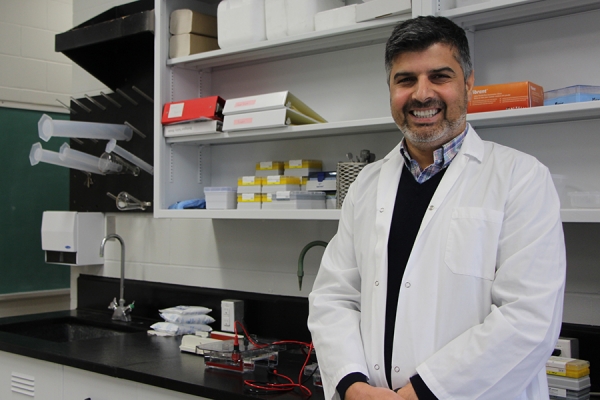 Biochemistry professor Munir Rahim has been awarded a $120,000 grant from the Cancer Research Society to study how breast cancer interacts with receptors on the surface of immune cells.
Biochemistry professor Munir Rahim has been awarded a $120,000 grant from the Cancer Research Society to study how breast cancer interacts with receptors on the surface of immune cells.
UWindsor’s Munir Rahim is launching ground-breaking research that could lead to new treatments for breast cancer.
A professor of biomedical science, Dr. Rahim is trying to unlock the mystery of how breast cancer outfoxes the body’s immune system. Collaborating with Caroline Hamm of the Windsor Regional Cancer Centre, Rahim believes new treatments may lie in how breast cancer interacts with specific proteins, called receptors, on the surface of immune cells.
“We are looking into the mechanisms that inhibit immune cells,” Rahim said. “This is brand new research. This receptor has not been studied in breast cancer.”
Rahim has been awarded a $120,000 research grant through the Cancer Research Society, a registered charity that raises money for Canadian cancer research, in partnership with the Canadian Institutes of Health Research, a federal funding agency.
Rahim explained the body’s immune system includes “natural killer cells” which search for, find, and kill unhealthy cells. “These cells constitute the body’s first line of defence against infections and cancers,” he said.
Natural killer cells use receptors to distinguish between healthy cells and cancerous ones. These receptors both activate the killer cells and inhibit them.
“Cancers have evolved ways to exploit the inhibitory receptor systems to inhibit immune responses and evade immune detection,” Rahim explained. “Our research work is focused on identifying and studying the function of the inhibitory receptors in natural killer cells and evaluating their potential as targets for immunotherapy against breast cancer.”
The Cancer Research Society last week announced funding totalling $9.6 million for 80 projects around the county. It’s the most funding the charity has ever awarded in a single year.
Rahim is one of two UWindsor researchers who won grants from the society. Chemistry professor John Trant also won a grant for his research into prostate cancer.
—Sarah Sacheli
